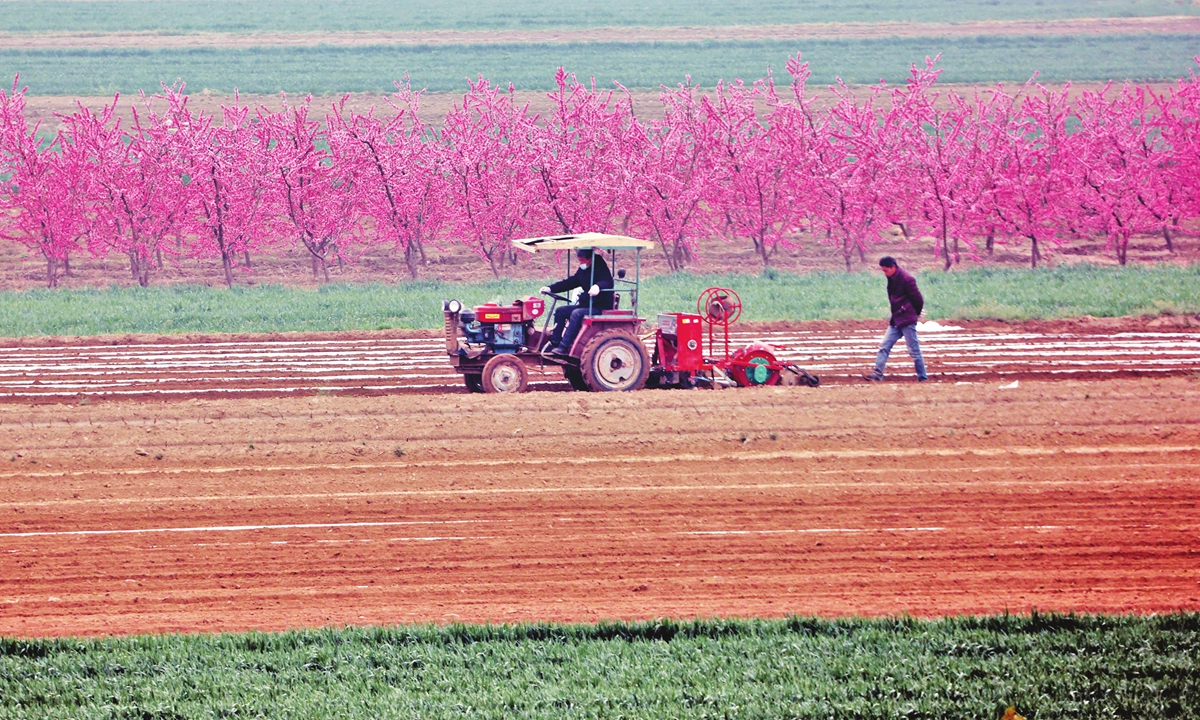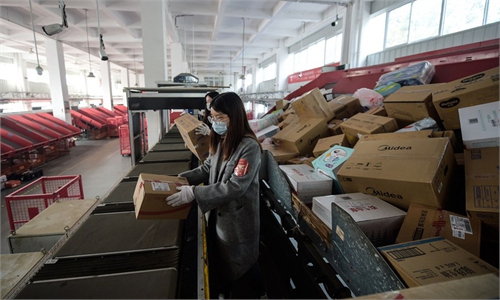Chinese farmers are embracing e-commerce to reduce costs, improving efficiency
New business models help reduce agricultural production cost, improve efficiency

Farmers work hard in the field during the annual spring farming on March 23, 2022 in Dali County, Northwest China's Shaanxi Province. Photo:cnsphoto
Dai Yifa (pseudonym), a peach orchard owner in Wuxi city, East China's Jiangsu Province, recently bought a small orchard lift from short video platform Douyin to help him pick peaches.
"I saw video bloggers advertising the lift when I was browsing videos the other day. They posted a video showing farmers using this product at orchards that are similar size to my own, and there are also instructions on how to install and use the machine. I was interested so I bought the product from the platform," he told the Global Times on Monday.
According to Dai, he rarely purchased farming products and equipment through the internet. But since the lift is not that expensive, he thought he might as well give it a try.
"Even if the lift is not as functional as the video showed, it was a good bargain," he said, adding that the product proved quite helpful, giving him confidence to procure farming materials on internet in the future.
Dai is one of a number of China's farming population that has started to buy agricultural products on the internet, because of a combination of factors---the rapid development of China's digital economy, the resurgence of the coronavirus which has made offline shopping less convenient in many regions, and of course, the arrival of the spring harvest which typically equates to a bump in demand for products and equipment.
Surging demand
Trade data released by China's e-commerce platforms showed that online trade turnover of agricultural materials such as pesticides, fertilizers and gardening products is surging.
According to a recent report released by JD.com's Consumption and Industry Development Institute, prior to the spring equinox of 2022, which falls on March 20 this year, "green consumption" which covers agricultural, gardening and plant products has increased significantly on the platform.
In particular, online transaction volume for agricultural products, plants and other green consumption items increased by more than 40 percent year-on-year on the platform since February 4 this year. The turnover of fertilizers and gardening items increased by 317 percent year-on-year, while sales of gardening supplies have surged by 247 percent.
The turnover of farming tools, pesticides and animal feed also surged 73 percent, 56 percent and 48 percent, respectively, on the platform, the report showed.
The platform further found that consumers born after 1985 and 1975 are the largest consumer group for agricultural supplies and gardening products, contributing to 32 percent of online commerce. The report showed that post-85s prefer to buy fertilizers, animal feed, flowers, and plants, while post-75s like to buy gardening supplies and seeds, the report noted.
In terms of geography, eastern China saw the highest growth in market share for online agricultural products, the report said.
Yuan Shuai, deputy secretary general of Rural Revitalization and Construction Committee under the China Culture Administration Association, said it's a growing trend that traditional agriculture practices will be influenced by the emergence of the digital economy in everyday life.
"Trading agricultural products online brings many benefits, such as enabling villagers' access to a wider range of products while helping farmers sell their products. China's agricultural material market is shifting from a product-centered model to a customer- orientated model," he told the Global Times on Sunday.
Shifting focus
It goes without saying that a transformation is underway, and there are still lots of Chinese farmers that are not familiar with online shopping.
Several farmers interviewed by the Global Times said that they are not willing to rely on the internet for sourcing important agricultural materials like seed or animal feed.
The aforementioned Dai said most farmers he knew do not buy gardening materials online, particularly with many old farmers not well adapted to using the internet.
Li Yunlong, a domestic hog farmer, told the Global Times on Monday that he wouldn't buy agricultural materials online because "there's no guarantee when it comes to quality."
On the bright side, it also signals that China's online agricultural materials trade has great potential for further growth, as the industry matures and as people gradually change their purchasing behavior.
According to Yuan, not every item is suitable for online trade. For example, chemical products like pesticides can't be sold on the internet in significant quantities.
However, he noted that the trend toward online selling will impact the entire sector, as the traditional business model faces challenges like lack of transparency, high cost and red tape, which cause the prices to be inflated.
On the other hand, production costs are also rising across the agricultural sector almost on a yearly basis, he said.
"Nowadays, given the fierce market competition and rising homogenization, agricultural material companies don't have much leeway to use price as a selling point, and going online to tap new markets is a good option," Yuan said, noting that companies should maintain traditional offline sales channels to sharpen their competitiveness.




